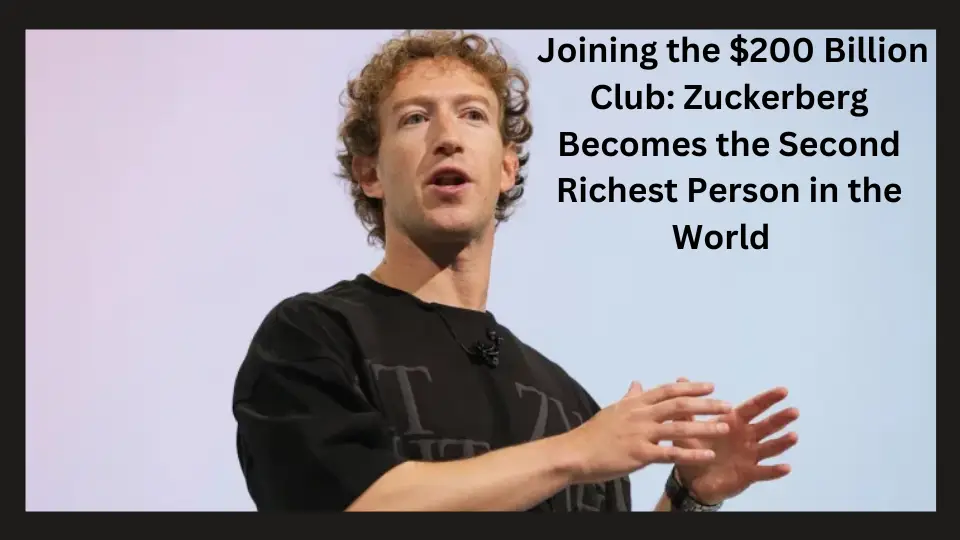Joining the $200 Billion Club: Zuckerberg Becomes the Second Richest Person in the World
Mark Zuckerberg, the co-founder and CEO of Meta Platforms (formerly Facebook), has joined the exclusive $200 billion club, a remarkable milestone that has solidified his position as one of the wealthiest individuals on the planet. Zuckerberg’s meteoric rise to financial success is a story of innovation, relentless ambition, and the strategic expansion of what began as a social networking site into a global technology powerhouse. As of now, Zuckerberg holds the title of the second richest person in the world, trailing only Elon Musk, the visionary behind Tesla and SpaceX.
This article will delve into Zuckerberg’s journey to this astonishing financial achievement, exploring the key factors behind his wealth accumulation, the evolution of Meta Platforms, the competitive landscape of the world’s richest individuals, and the broader implications of such immense personal wealth in the modern era.
The Journey to $200 Billion: From Dorm Room to Dominance
Mark Zuckerberg’s ascent to billionaire status began humbly in 2004 when he, along with his college roommates, launched Facebook from his dormitory at Harvard University. Originally conceived as a social network for college students, Facebook quickly expanded beyond the academic world and became a global phenomenon. By connecting billions of people worldwide, the platform revolutionized how individuals interacted, shared content, and consumed information.
Zuckerberg’s early decision to forgo a traditional career path and focus solely on Facebook paid off in ways even he may not have fully anticipated. As the platform grew in popularity, so did Zuckerberg’s control over the company, which later expanded its reach by acquiring other major social media platforms, like Instagram and WhatsApp. This strategic growth significantly contributed to his increasing net worth.
The real breakthrough in Zuckerberg’s wealth, however, came from Facebook’s Initial Public Offering (IPO) in 2012. The company’s stock soared, and with it, so did Zuckerberg’s fortune. By retaining a significant stake in the company, Zuckerberg ensured that he would benefit from Facebook’s financial success long into the future. As Facebook continued to grow its user base and advertising revenue, the platform’s dominance in the social media industry became undeniable.
Meta Platforms: A Rebranding and Expansion into the Future
In 2021, Zuckerberg and his team made a bold decision to rebrand Facebook as Meta Platforms, signaling a new direction for the company. The rebranding was more than just a name change; it reflected Zuckerberg’s vision for the future of the internet—specifically, the metaverse.
The metaverse, a virtual reality (VR) and augmented reality (AR) space where users can interact with each other and digital environments, represents Zuckerberg’s ambition to create a new digital frontier. Meta’s development of VR technology through its Oculus division and its investment in building digital infrastructure for the metaverse have positioned the company to be at the forefront of this technological revolution.
The rebranding and Meta’s shift in focus were met with skepticism from some quarters, but Zuckerberg has remained steadfast in his belief that the metaverse is the future of online interaction. This strategic pivot has allowed Meta to diversify its revenue streams beyond traditional social media advertising, making the company more resilient in the face of evolving consumer behavior and technological advancements.
The Surge in Meta’s Stock and Zuckerberg’s Wealth:
A key factor that has propelled Zuckerberg into the $200 billion club is the massive surge in Meta’s stock value. Over the past few years, despite facing regulatory scrutiny, privacy controversies, and competitive pressures, Meta has continued to generate enormous profits, largely driven by its advertising business. Facebook, Instagram, and WhatsApp, all part of Meta’s ecosystem, collectively boast billions of users. This immense user base has attracted advertisers eager to reach specific demographics, driving the company’s ad revenue through the roof.
Additionally, Meta’s investments in VR and AR have opened new revenue streams. The company’s Oculus VR headsets have been popular among gamers and tech enthusiasts, while the development of immersive experiences for the metaverse has attracted attention from both businesses and consumers. These investments in the future of digital interaction have reassured investors that Meta is not just a social media company but a technology leader with long-term growth potential.
As Meta’s stock surged, so too did Zuckerberg’s wealth. His significant ownership stake in the company, combined with stock options and dividends, has pushed his net worth beyond $200 billion, placing him firmly in the upper echelons of the world’s richest individuals.
The $200 Billion Club: An Exclusive Group of Billionaires:
Mark Zuckerberg’s entry into the $200 billion club puts him in an extremely rarefied group of billionaires. Prior to him, only two individuals—Jeff Bezos, the founder of Amazon, and Elon Musk, the CEO of Tesla and SpaceX—had achieved this remarkable financial feat.
Jeff Bezos: Bezos was the first person to reach a net worth of $200 billion in 2020, thanks to Amazon’s dominance in e-commerce and cloud computing. His wealth, however, fluctuated following his divorce and the division of his assets.
Elon Musk: Musk’s fortune skyrocketed in 2021, driven by the soaring stock prices of Tesla and his ventures in space exploration through SpaceX. Musk has since claimed the title of the world’s richest person, with his wealth surpassing $250 billion at its peak.
What sets Zuckerberg apart from Bezos and Musk is the relatively shorter time frame in which he reached this milestone. While Bezos and Musk have been building their empires for decades, Zuckerberg reached this level of wealth in less than 20 years, a testament to the rapid growth of the social media industry and Meta’s dominance in the digital advertising space.
The Impact of Zuckerberg’s Wealth on Meta and Society:
Zuckerberg’s immense wealth is not only a reflection of Meta’s financial success but also a symbol of the company’s influence on society. Meta’s platforms, including Facebook, Instagram, and WhatsApp, have reshaped how people communicate, consume news, and engage with the world. However, with this power comes significant responsibility, and Zuckerberg has faced increasing scrutiny over the role his platforms play in spreading misinformation, protecting user privacy, and addressing the mental health impacts of social media usage.
Critics argue that the concentration of wealth and power in the hands of tech moguls like Zuckerberg poses ethical and societal challenges. As Zuckerberg’s wealth continues to grow, so too does the influence he wields over the digital landscape. Some have called for greater regulation of tech giants like Meta to ensure that they are held accountable for their impact on society.
In response to these concerns, Zuckerberg has taken steps to address some of the criticisms leveled against Meta. The company has invested in artificial intelligence (AI) to combat misinformation and hate speech on its platforms, and it has made commitments to improve user privacy and data security. Additionally, Zuckerberg has pledged to donate a significant portion of his wealth to philanthropic causes through the Chan Zuckerberg Initiative, which he founded with his wife, Priscilla Chan. This philanthropic organization focuses on addressing major global challenges, including education, healthcare, and scientific research.
Challenges and Controversies along the Way:
While Zuckerberg’s rise to financial success is undoubtedly impressive, it has not been without its challenges. Over the years, Meta has faced numerous controversies, ranging from privacy violations to concerns about the spread of misinformation on its platforms. The Cambridge Analytical scandal in 2018, where millions of Facebook users’ data were harvested without consent, marked a major turning point in public perception of the company. Since then, Meta has been under intense regulatory scrutiny, particularly in Europe and the United States.
In addition to privacy concerns, Meta has been criticized for its role in shaping political discourse, with some accusing the platform of facilitating the spread of fake news and political manipulation. The company’s handling of these issues has been a subject of debate, with many questioning whether Zuckerberg and his team are doing enough to protect users and ensure the integrity of the platform.
Moreover, Meta’s shift toward the metaverse has raised eyebrows, with critics questioning the feasibility and desirability of a fully immersive virtual world. While Zuckerberg is betting big on the future of digital interactions, skeptics argue that the metaverse may not live up to its hype, and the substantial resources being poured into its development could backfire if consumer interest does not materialize as expected.
The Future of Zuckerberg and Meta:
As Zuckerberg continues his journey as one of the world’s wealthiest individuals, the future of Meta and his personal fortune remains closely intertwined. Meta’s success in transitioning from a social media giant to a leader in the metaverse and digital technologies will be critical to sustaining Zuckerberg’s financial position.
The company’s investments in virtual reality, augmented reality, and artificial intelligence indicate that Zuckerberg is thinking long-term. While social media will likely remain a core component of Meta’s business, the shift toward new technologies suggests that Zuckerberg is positioning Meta to be a dominant force in the next phase of the internet’s evolution.
For Zuckerberg personally, his growing wealth could enable him to take on even more ambitious philanthropic initiatives. Through the Chan Zuckerberg Initiative, he has already committed to tackling some of the world’s most pressing issues. As his fortune grows, so too does his potential to influence positive change on a global scale.
Conclusion:
Mark Zuckerberg’s entry into the $200 billion club is a remarkable achievement that underscores his influence in the technology sector and his success in building one of the most powerful companies in the world. His rise from a college student developing a social networking site to becoming the second richest person on the planet is a testament to his vision, determination, and business acumen.
However, with great wealth comes great responsibility, and Zuckerberg faces ongoing challenges related to Meta’s societal impact, privacy concerns, and the future of the metaverse. As Zuckerberg continues to chart the course for Meta and his personal legacy, the world will be watching closely to see how he navigates the opportunities and obstacles ahead.



